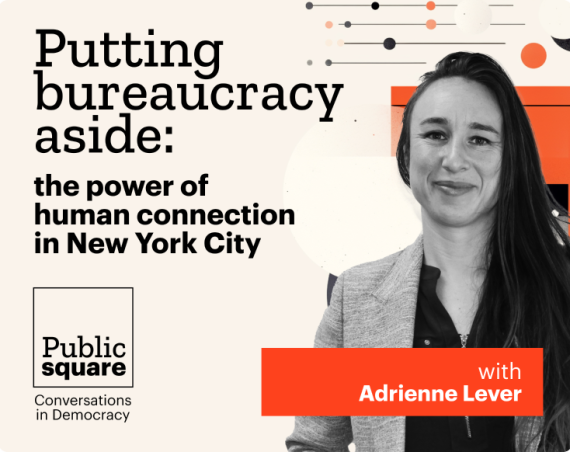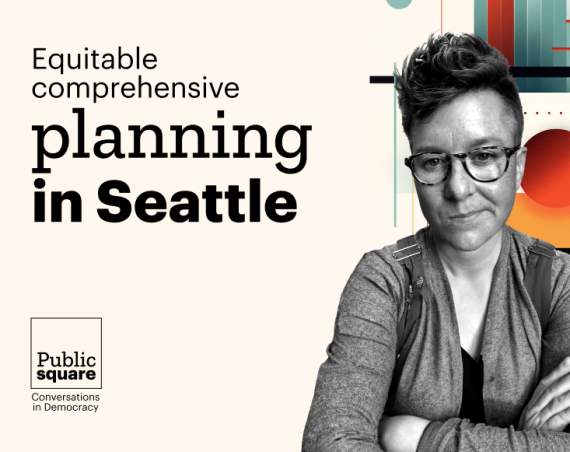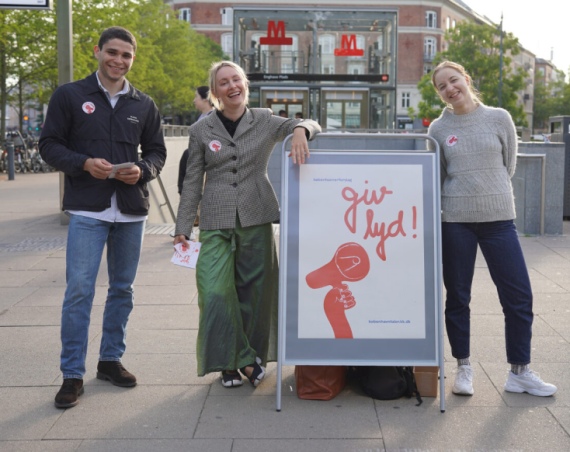Creative Bureaucracy is a thing now. It’s so much of a thing, in fact, that it has its own festival, where thousands of civil servants and policy-makers connect over talks and workshops. We tuned it to the online event to learn more about innovation in government, public service culture and new models of governance. Here are 5 learnings from the sessions that we attended – some poetic, some radical, all inspiring.
1. Politics and policy-making should go hand in hand.
In this session led by Lisa Witter (co-founder and executive director Apolitical), participants discussed the link between politicians and policy-makers, and the ways in which policy and politics could come together. Lindiwe Mazibuko, South Africa’s former Parliamentary Leader for the opposition Democratic Alliance, explained that there is a bridge to gap between “the poetics of politics and the prose of policy”. Separating politics from policy leads to empty promises on the one hand, and ill-received policies on the other.
“Policy has to be at the core of every communication, every move, every PR stunt. Once people understand the policy behind the ideology, they get behind the issues – they pick ideas, and not personalities”, she argued.
But it should go both ways, and it was mentioned that policy-makers should also embrace politics. They have a role to play in helping politicians explain the policies and convince the voters. As Robyn Scott, (co-founder and CEO, Apolitical) explained, civil servants also often have to become “internal politicians”: they convince teams (who sometimes have competing interest), fight for resources, and gain support for their policies. Amongst civil servants, there is therefore a strong demand for better stakeholder management training.
Finally, Marco Camargo from Vetor Brazil stressed the importance for a politician of choosing the right team to execute policies. Talent management and human resources really matter to help policies be implemented and promises kept!
2. We can’t rely on crises to innovate.
In a session called “Lessons from the OECD: Governments after shock”, Alex Roberts from the Observatory of Public Sector of Innovation discussed the challenges of innovating in a government setting. The current COVID crisis has had some positive impact on governments by pushing digital innovation forward – over the last couple of months, tremendous progress has been made in digital service delivery or online community engagement. However, as Roberts points out, we can’t rely on crises to force innovation. We need to build our institutions and governments in such a way that they are continually experimenting and evolving.
The Public Sector of Innovation separates government innovation into 4 main types:
- Enhancement innovation, which relies on current habits and applies new knowledge to existing work. The most concrete example of this is behavioural insights such as the UK government’s Nudge Unit. This type of innovation tends to comfort existing values.
- Anticipatory innovation, which is bolder and more radical. Anticipatory innovation is a deep dive into what the future might look like, and it tries to create new ideas and values. Governments are usually better at innovation when they know that the cost of unpreparedness is high: the best examples are found in health and defence. Because it’s the hardest innovation to conduct, it’s also the rarest.
Alex Roberts adds that there is a lot of radical innovation happening outside of government, which can destabilize them. He takes the example of social media: rather than proactively engaging with this technology, governments reacted too late and had to legislate once the innovation was deeply embedded in society. - Mission oriented innovation, which is top-down, driven innovation carried out by governments in the pursuit of one precise goal – for instance, getting a man on the moon. This is the type of innovation governments are more at ease with.
- Adaptive innovation, which consists in bottom up, people-driven innovation. It is undirected, can be unprepared and responding to things on the ground. This example can stem from citizen proposals or citizen assemblies.
Now that the initial shock of the initial health crisis has passed, it is time for governments to assess the changes and share their hard-learned lessons. It is an opportunity to leave outdated processes behind, to adapt work processes and to prepare the innovations of tomorrow.
3. Governments need to learn how to co-create
How do you effectively bring institutions to gather with activists in order to tackle inequalities and redesign democracies? According to Panthea Lee, Executive Director of Reboot, part of the challenge of implementing social change is that we think in terms of sectors. Governments, activists, and the private sector are all considered as separate entities – but many of the problems facing our world today require cross and multi disciplinary perspectives.
These different profiles come from different backgrounds, have different worldviews and often don’t really understand each other. However, they are all experts in their own way and need to collaborate to solve pressing issues. Lee helps actors who don’t understand or like each other sit at the table together and make them see each other as humans first, acknowledging their shared humanity. Lee shared that the most important skills or qualities for people to bring about change is the ability to really listen, knowing which questions to ask.
When it comes to collaborating, the biggest challenge for institutions and governments is to give up control. Understandably, cities aren’t comfortable investing funds in visions they don’t understand and in pooling resources with organisations they are not familiar with. However, if we believe in overturning systems, part of the answer is reimagining partnership frameworks and overturning bureaucratic hurdles that stand in the way. For radical change to happen, cities have to devolve some of their power and support citizen projects; and for that, they have to be ready to listen.
Panthea Lee also shared more insights into what makes a successful co-creation process. She stressed that co-creation is never “throwing a bunch of people into a room and expecting magic“- it’s taking into account historical inequalities (current historical reckonings in the US), calling out and tackling power imbalances, and most of all investing resources in the projects that follow. You can find out more on her Twitter profile.
4. Forget about brains, think about bodies.
When it comes to smart cities, cities are often depicted as having a digital “brain”, which processes data and makes decisions. Geoff Mulgan (Professor of Collective Intelligence, Public Policy and Social Innovation at University College London and Nesta‘s previous executive director) and Marleen Stikker (Waag founder) discussed how this vision is outdated and even dangerous.
Cities, they argued, actually resemble a living, breathing body – or even funghi – in the way that they work with competing, changing elements and continually learn from their experiences. The data-driven government just isn’t enough: cities should give experiments and user stories a more central place in their decision-making process. As Geoff Mulgan puts it, governments should learn to use “all their senses“.
5. Technology is a means, not an end.
This discussion with Petra Dzurovčinová (Chief Innovation Officer of the City of Bratislava), Ivari Rannama (Director of Geomatics at the City of Tallinn), and Csaba Pogonyi (Chief Policy Adviser to the City of Budapest) touched upon harnessing collective intelligence in cities. All participants agreed that technology was only a means to greater good – whether this was better access to care, improved service delivery or innovative solutions for climate change.
To be successful, technology doesn’t have to be shiny or complicated: it starts with readable web pages, clickable buttons and accessible data. It also has to be grounded in thorough user research to make sure it is tackling the most relevant issue. Csaba Pogonyi, from the city of Budapest, for instance shared that research into improving social care showed the most important aspect to solve was… queues and waiting times in doctors’ offices!





